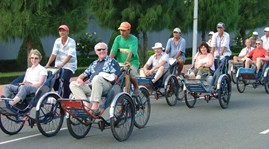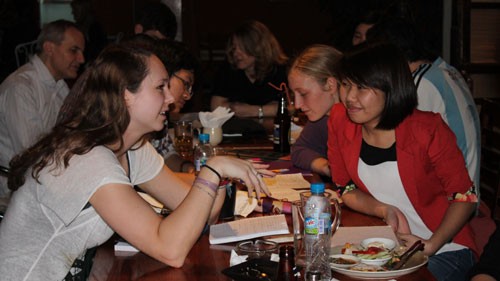A: This week, we received a warm greeting from our Australian friend and listener, Stephen Hogan, who has not written to us for quite a long time. In his letter dated May 23, Stephen told us that the autumn was in its final week before the winter began on June 1. It was cool and cloudy with brief appearance of the sun. The autumn trees had lost their leaves.
B: When we got the letter, winter had already come to your place in New South Wales. I checked the weather forecast and saw that the temperature there varies from 10 to 19 DC. Meanwhile, in this part of the world, we are in the middle of the summer season with the highest temperature at 38 DC. Occasionally during the scotching summer, we have cool and pleasant days after a storm or showers. The temperature then drops to below 30 DC.

Summer is a favorable tourist season in Vietnam
|
A: Now, let’s get back to Stephen’s letter. He wrote: “With good reception from Vietnam to my home, I enjoy your informative, entertaining, interesting, and varied programs. Thank you for all the well-received and much-appreciated letters I have received since my last correspondence to VOV. The New Year card and a table calendar are now on top of my YAESU receiver. QSL cards are proudly displayed in my QSL album. The wonderful 2013 wall calendar which came wrapped in lovely paper, is now displayed on my lounge room.”
B: Thank you very much Stephen for tuning in to VOV again and treasuring VOV’s souvenirs. We’ve checked your reception report for the program on April 26th. “The frequency 9730 khz at 20:30 UTC is currently giving very good strong reliable signals. This is a good time for me and the reception is most pleasing.” Your signal report is precise with our station log and we’ll definitely confirm it with our QSL card. We hope you’ll continue to monitor our program.
A: My most anticipated letters weekly are from Fumito Hokamura of Japan. Here I have four letters from him for the programs on May 25, 26, 29, and 30. His reception reports are always detailed and precise. He wishes us enjoyable summer days. He dreamed of being transported to Vietnamese beaches and visit islands. This is the peak of the tourist season in Vietnam. People rush to hundreds of beaches scattered along the 3,260 km coastline. The most beautiful beaches and bays are in the central region.
B: I also enjoy reading Fumito’s letters. He always tells us what he likes about Vietnam such as folk songs, some kinds of food, and history. Thank you Mr. Fumito for your specific comments and love for Vietnam in general and Voice of Vietnam in particular. Here I have an email from Adam Eng of Malaysia who suggested VOV to commence an Esperanto program.
A: He wrote: “I read from the web info that Vietnam radio had Esperanto programs in the 50s during the national resistance war period but later abandoned it. It’s a pity. You can begin with a weekly program of 15 or 30 minutes and this would help those who do not understand English language to know more about your country.”
B: Your initiative is very interesting Adam. Vietnam advocates the development of Esperanto which was recommended by UNESCO in 1954. The country hosted the 97th World Congress of Esperanto (UK 97) in Hanoi last year with a variety of activities, including teaching Esperanto, symposiums, eloquence contests, presentation of international certificates of Esperanto and cultural exchanges. At present, VOV produces programs in 11 languages which are the most used languages globally including English, French, German, Russian, Spanish, Chinese, Japanese, Laos, Thai, Cambodian, and Indonesian and of course Vietnamese for the overseas Vietnamese community.
A: Our programs serve specific communities of listeners who don’t speak English, the most popular language at present. We’ll forward your proposal of an Esperanto program to our boss for consideration. Once again, thank you for your idea and we support your wish that Esperanto can be used as a regional communication language in ASEAN and promote exchanges among the ASEAN people.
B: Some listeners want to know how many foreigners are living in Vietnam. The General Statistics Office reported in 2012 as many as 75,000 foreigners from over 60 nations lived and worked in Vietnam. The main reason is living cost here is much lower than in many other countries. And it's relatively easy to find a job.
A: In general, most foreigners living here agree that Vietnam is an emerging economy, and there is great potential and opportunities. They also said living in Vietnam is relatively safe.

Foreigners learn Vietnamese
|
B: Richard Lemke, a Canadian listener, asked “Does Vietnam celebrate Father’s Day?” Father's Day is a celebration honoring fathers and celebrating fatherhood, paternal bonds, and the influence of fathers in society. It is celebrated on the third Sunday of June. Father's Day was created to complement Mother’s Day in March or May, a celebration that honors mothers and motherhood.
A: Traditionally we don’t celebrate Father’s and Mother’s Days. We pay tribute to our parents on the 15th Day of the 7th Lunar month, which is called Vu Lan festival. On this day, the children often prepare a party and present gifts to their parents. We also go to clean and decorate ancestors’ graves.
B: We celebrate International Women’s Day on March 8 and Vietnam Women’s Day on October 20 to acknowledge women’s role in society and family. This is a day for the men to show their gratitude and love to their mothers, wives, daughters, lovers, and female colleagues.
A: The men say it’s unfair as there is no special day for them. (laugh) Well, men you have all other 363 days of the year. Next is an email from Ralf Urbanczyk of Germany. He commented: “It was interesting to learn about activities in Vietnam on the birthday of Buddha. Because in Germany we don’t have a big Buddhist community, activities of members of that religion are not seen so often and people do not know much about it. I’m impressed about activities of Vietnamese Buddhists and it is widespread throughout Vietnam.”
B: Ralf wanted to learn about the relationship of Vietnamese Buddhists and the leading Communist Party of Vietnam. He asked “Does the Vietnamese Communist Party permit Buddhists to be member of the Party and do Buddhist monks permit members of the Communist Party to visit the temples?.”
A: Vietnam pursues a continual policy of respecting and fostering freedom of belief and religion, and considers all religions equal under the law. Religious followers are treated equally in political and social activities. The ruling Communist Party of Vietnam operates under the law. It admits followers of all religions including Buddhists and Christians, as its members. Buddhist pagodas and temples, Catholic churches, and worship centers of other religions are open to all people including members of the Communist Party and followers of other religions.
B: On our website at www.vovworld.vn, we have many reports on religious festivals in Vietnam such as Christmas and Buddha’s Birthday. You can find pieces of news and photos of Party and State leaders participating in religious events. Time is running out on VOV’s Letter Box. Thank you all for spending time with us and for your detailed feedback. Before we go, let us remind you once again of our address:
English section, Overseas Service, Radio Voice of Vietnam, 45 Ba Trieu Street, Hanoi, Vietnam. Or you can email us at: englishsection@vov.org.vn. You’re invited to visit us at www.vovworld.vn, where you can hear both live and recorded programs. Good bye for now.